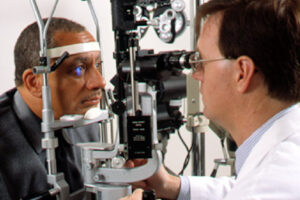
Having trouble distinguishing colors, such as blue from black?
Needing more time to adjust to changing levels of light?
These problems are often easily corrected. Glasses, contact lenses, and improved lighting may help and enable you to maintain your lifestyle and independence.
Your risk for some eye diseases and conditions increases as you grow older, and some eye changes are more serious. Keep your eyes as healthy as possible by getting regular eye exams so any problems can be spotted early.
Have your eyes checked regularly by an eye care professional — either an ophthalmologist or optometrist. Finding and treating any problems early can help protect your vision and prevent vision loss. Make a list of your questions and concerns to share with the doctor. Tell them which medications you are taking. Some can affect your eyes.Eye doctor using medical equipment to examine an older adults eyes
Normal changes in the aging eye usually do not harm your vision. However, sometimes they can be signs of a more serious problem. For example, your eyes may leak tears. This can happen with light sensitivity, wind, or temperature changes. Sunglasses and eye drops may help. Sometimes, leaking tears may be a symptom of dry eye or sign of an infection or blocked tear duct. Your eye care professional can treat these problems.
Many people don’t notice any signs or symptoms in the early stages of eye diseases. A dilated eye exam performed by an eye care professional is the only way to find some common eye diseases while they’re easier to treat — and before they cause vision loss. Everyone over age 50 should have a dilated eye exam every year or as recommended by your eye care professional, even if you have good vision and don’t wear contacts or glasses. After age 60, you should get a dilated eye exam every year or two. Most people with diabetes or high blood pressure need to get a dilated exam at least once a year.
During this exam, the eye care professional will put drops in your eyes to widen (dilate) your pupils so that he or she can better see inside each eye. Your vision may be blurry after the exam, and your eyes may be more sensitive to light. This only lasts a few hours. Make plans for someone else to drive you home.
If you wear glasses or contact lenses, get your prescription checked, too. Even small changes in sight can increase your risk for falls and injuries. It’s important to use the proper prescription glasses or contact lenses.
See your primary health care provider regularly to check for diseases like diabetes and high blood pressure. These diseases can cause eye problems if not controlled or treated.
